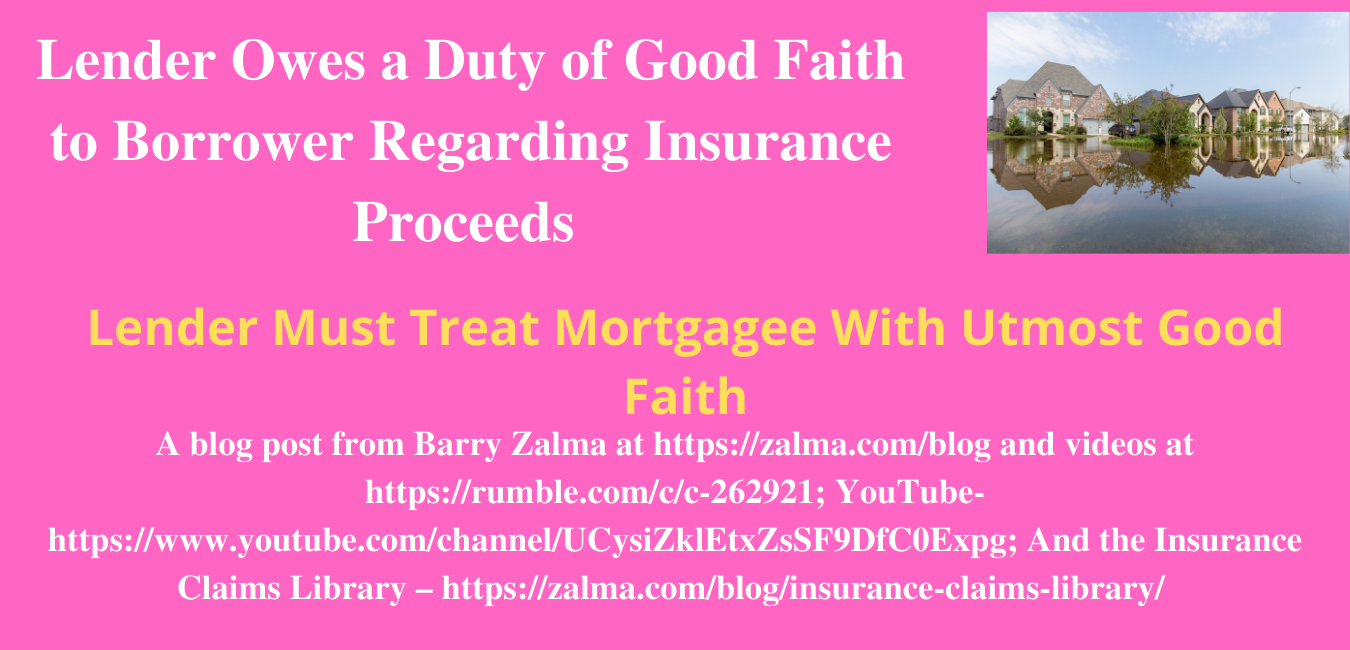-
News Feed
- EXPLORE
-
Pages
-
Groups
-
Events
-
Blogs
-
Marketplace
-
Offers
-
Jobs
-
Developers
Lender Owes a Duty of Good Faith to Borrower re Insurance Proceeds

Lender Must Treat Mortgagee With Utmost Good Faith
Read the full article at https://www.linkedin.com/pulse/lender-owes-duty-good-faith-borrower-regarding-barry-zalma-esq-cfe and at https://zalma.com/blog plus more than 3950 posts.
When a mortgaged residence is damaged by a storm and the homeowners’ property or flood insurer pays benefits for the storm damages, how should the mortgage company determine whether to use those insurance funds to pay down the delinquent mortgage principal and interest, or, alternatively, use the funds to repair the property, as provided by the loan agreement? In Wilmington Savings Fund Society, FSB, d/b/a Christiana Trust, not individually but as trustee for Pretium Mortgage Acquisition Trust, Plaintiff-Respondent v. Patricia E. Daw and Richard C. Daw, and TD Bank, N.A., and State Of New Jersey, No. A-0829-19, Superior Court of New Jersey, Appellate Division (October 22, 2021) the court established a duty of good faith and fair dealing between a lender and mortgagee with regard to the proceeds of an insurance claims.
When the loan agreement states the lender may choose to apply the funds to the outstanding debt if either repairs are “economically infeasible” or if such expenditures would impair the lender’s security interest, the lender has an obligation to the borrower to make that decision promptly and in good faith?
Lenders and their assignees must convey their decisions and reasons concerning the disposition of insurance proceeds to homeowners with clarity and consistency.
The insurance funds are viewed as substitute collateral and the mortgagee’s claim on them is sometimes described as an “equitable lien.”
ZALMA OPINION
People sometimes forget that the covenant of good faith and fair dealing applies to all contracts, not just insurance contracts. In this case the New Jersey court enshrined that duty on mortgage contracts with regard to the use of insurance proceeds held by the mortgagor instead of applying the funds to the repair or to reduce the mortgage debt. The mortgagor did neither and was chided by the court for holding money for too long without explaining the reasons to the mortgagee. There are no tort damages for the breach but there are contract damages that may be available to the mortgagee.
© 2021 – Barry Zalma

We are 100% funded for October.
Thanks to everyone who helped out. 🥰
Xephula monthly operating expenses for 2024 - Server: $143/month - Backup Software: $6/month - Object Storage: $6/month - SMTP Service: $10/month - Stripe Processing Fees: ~$10/month - Total: $175/month
- Art
- Causes
- Crafts
- Crime
- Dance
- Drinks
- Film
- Finance
- Fitness
- Food
- Games
- Gardening
- Health
- Home
- Literature
- Music
- Networking
- Paranormal
- Other
- Politics
- History
- News
- Party
- Science
- Religion
- Shopping
- Sports
- SyFy
- Politically Incorrect
- Philosophy
- Theater
- Technology
- Wellness



